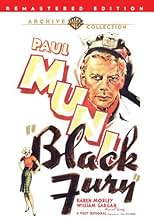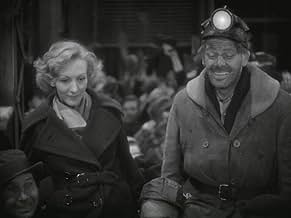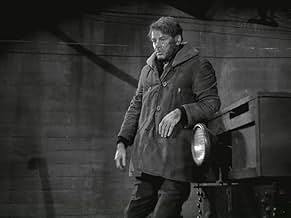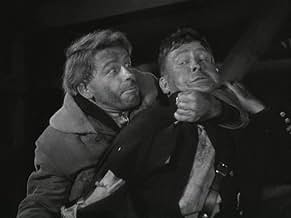AVALIAÇÃO DA IMDb
6,5/10
1,1 mil
SUA AVALIAÇÃO
Adicionar um enredo no seu idiomaAn immigrant coal miner finds himself in the middle of a bitter labor dispute between the workers and the mine owners.An immigrant coal miner finds himself in the middle of a bitter labor dispute between the workers and the mine owners.An immigrant coal miner finds himself in the middle of a bitter labor dispute between the workers and the mine owners.
- Direção
- Roteiristas
- Artistas
- Indicado a 1 Oscar
- 2 vitórias e 2 indicações no total
John Qualen
- Mike
- (as John T. Qualen)
J. Carrol Naish
- Steve
- (as J. Carroll Naish)
Joseph Crehan
- Farrell
- (as Joe Crehan)
Sara Haden
- Sophie Shemanski
- (as Sarah Haden)
G. Pat Collins
- Lefty - Company Policeman
- (as George Pat Collins)
Avaliações em destaque
Joe Radek (Paul Muni) is a simple-minded, hardworking immigrant coal miner who dreams of buying a farm and settling down with his girl, Anna (Karen Morley). But when Anna leaves him for another man, Joe falls apart and takes to drinking. In Joe's current state of mind, he's manipulated by a union buster (J. Carrol Naish) into revolting against the mining company. This has disastrous results for the laborers but Joe determines to set things right by any means necessary.
Paul Muni's only film with director Michael Curtiz. As was often the case with Muni, his performance can be seen either as brilliant or 100% ham. Whichever it is, I enjoyed it a lot. The cast is full of reliable Warner Bros contract players that are always fun to watch, especially great character actor J. Carrol Naish. It's not surprising this is from WB, the 1930s home of movies about the working class. Certainly interesting from a historical and sociological perspective as a view of labor issues in Depression-era America. It's also fine dramatic entertainment. Based in part on a true story of a 1929 incident at a mine in Imperial Pennsylvania.
Paul Muni's only film with director Michael Curtiz. As was often the case with Muni, his performance can be seen either as brilliant or 100% ham. Whichever it is, I enjoyed it a lot. The cast is full of reliable Warner Bros contract players that are always fun to watch, especially great character actor J. Carrol Naish. It's not surprising this is from WB, the 1930s home of movies about the working class. Certainly interesting from a historical and sociological perspective as a view of labor issues in Depression-era America. It's also fine dramatic entertainment. Based in part on a true story of a 1929 incident at a mine in Imperial Pennsylvania.
Paul Muni, David Thomson once wrote, was the '30s' idea of a great actor: He never looked the same twice. Here he's a hail-fellow-well-met Eastern European immigrant coal miner in a dreary Pennsylvania burg, deceived by union busters and weighed down by a ten-ton accent. Indeed the screenplay seldom rises above a fifth-grade literacy level, the better to illustrate the goodheartedness of these poor but honest laborers. But five minutes of Muni, and you've seen the whole performance -- a Zorba-the-miner "life force" who yells all his lines and sounds unfortunately like Steve Martin's wild-and-crazy-guy character from Saturday Night Live in the '70s.
Warners does come up with a convincingly grimy set and a capable stock-company supporting cast, but the dramaturgy is connect-the-dots. One miner shouts and sways the whole crowd, then another, then another -- what a gullible bunch this must be. The evil cops and management figures are so absurdly evil that nuance is lost. The third act does whip up to an exciting blow-up-the-mine climax, but then it's resolved in headline montages, as if Warners suddenly ran out of money, or film. And Michael Curtiz -- I didn't think this fine director was capable of this -- stages the crowd scenes clumsily, shifting point of view confusingly and slapping the mise-en-scene together hard, with loud music. Certainly the studio is on the side of the angels, arguing for a fair day's pay for a fair day's work, and as a '30s sociological curio the movie is not without interest. But Muni's monotonous bluster and an elementary script combine to create a cinematic cave-in.
Warners does come up with a convincingly grimy set and a capable stock-company supporting cast, but the dramaturgy is connect-the-dots. One miner shouts and sways the whole crowd, then another, then another -- what a gullible bunch this must be. The evil cops and management figures are so absurdly evil that nuance is lost. The third act does whip up to an exciting blow-up-the-mine climax, but then it's resolved in headline montages, as if Warners suddenly ran out of money, or film. And Michael Curtiz -- I didn't think this fine director was capable of this -- stages the crowd scenes clumsily, shifting point of view confusingly and slapping the mise-en-scene together hard, with loud music. Certainly the studio is on the side of the angels, arguing for a fair day's pay for a fair day's work, and as a '30s sociological curio the movie is not without interest. But Muni's monotonous bluster and an elementary script combine to create a cinematic cave-in.
"Black Fury" was the only time Paul Muni worked with Michael Curtiz. Potentially, this film could have been great but it is far from that. Muni wasn't very keen on acting in films, his preference was always going to be the theatre. He wasn't able to tone down his acting style for the cinema for the most part and he often appeared to be playing a caricature. He is guilty of this in the film "Black Fury." He is too theatrical in his facial expressions, his body language etc. Paul Muni plays a simple but honest coal miner who unwittingly becomes involved in a bitter dispute between the workers and the management. Muni, along with other miners, is subjected to intimidation. Barton MacLane is cast as a villain (he usually was) who is sent to destroy the livelihood of all the coal miners in this small community. Technically, the film is a disappointment. It is all too obvious that the sets representing the town in question are all on a soundstage. The sets don't look real and the direction from Michael Curtiz tends to suffer. The story itself is actually quite good and the film maintains a steady pace. The climax is also effective.
10kcfl-1
Let's look at 1935: I don't think there's anyone reviewing now who went to the movies that year, so we have to rely on video. I've seen about 100 films from that year; many have not been preserved. "The Informer"won the Oscar, and a worthy film it was. "A Night at the Opera," "ChinaSeas," "The Good Fairy" "Lives of a Bengal lancer," "Naughty Marietta,"and "The Devil Is a Woman" also came out that year, all great films. "Black Fury" was better than any of them. It's gripping from the first frame to the last. It's as realistically set, and politically sensitive, as any Hollywood film. The closest political thriller I've seen to it is "Massacre" (1934). I loved it for the big factors, like digging itself into an impossible hole, then managing to escape, and Muni's performance. Also for the small ones, like all the supporting performances and the fact that the union happens to be integrated.
Never realized that Paul Muni, (Joe Radek) played in a film concerning miners in Pennsylvania and gave such an outstanding performance beyond anything I realized he had accomplished in his long career on the silver screen. In this film Joe Radek is an immigrant to this country, however, he is very clever in many ways and seeks justice for his fellow workers in the coal mine in which the town people work. Karen Morley,(Anna Novak) gives a great supporting role to this film and really loves Joe Radek and what he is trying to accomplish. The town is controlled by the coal mine owners and Barton MacLane,( McGree )along with William Gargan,(Slim Johnson/Company Police bully the people in the town along with J Carrol Nash,(Steve Croner) who all work against the miners and control their living conditions. There is a big problem trying to establish a Labor Union and there is a constant battle between the very poor and rich people of the community. Paul Muni gave the best performance I have ever seen in this Classic 1935 film, don't miss this picture.
Você sabia?
- CuriosidadesThough it received no official Oscar nominations, the Academy permitted write-in candidates this year and when the voting order was announced it turned out that Paul Muni had come in second in the balloting, narrowly behind winner Victor McLaglen but ahead of any of the other nominated actors.
- Erros de gravaçãoAt c. 24 minutes Joe is counting out his money, but he is inconceivably inaccurate. After counting to 68 dollars he places two further bills on the table and counts "73" out loud. A few moments later he counts up to 75 dollars, but, after four more bills have been placed in front of him he announces "76" dollars as his total.
- ConexõesFeatured in Hollywood and the Stars: The Angry Screen (1964)
- Trilhas sonorasWhy Do I Dream Those Dreams?
(1934) (uncredited)
Music by Harry Warren
Played on piano in bar during scene where men challenge Radek
Principais escolhas
Faça login para avaliar e ver a lista de recomendações personalizadas
Detalhes
- Data de lançamento
- País de origem
- Idioma
- Também conhecido como
- Black Fury
- Locações de filme
- Warner Ranch, Calabasas, Califórnia, EUA(mine shaft scenes)
- Empresa de produção
- Consulte mais créditos da empresa na IMDbPro
- Tempo de duração
- 1 h 34 min(94 min)
- Cor
- Mixagem de som
- Proporção
- 1.37 : 1
Contribua para esta página
Sugerir uma alteração ou adicionar conteúdo ausente





































